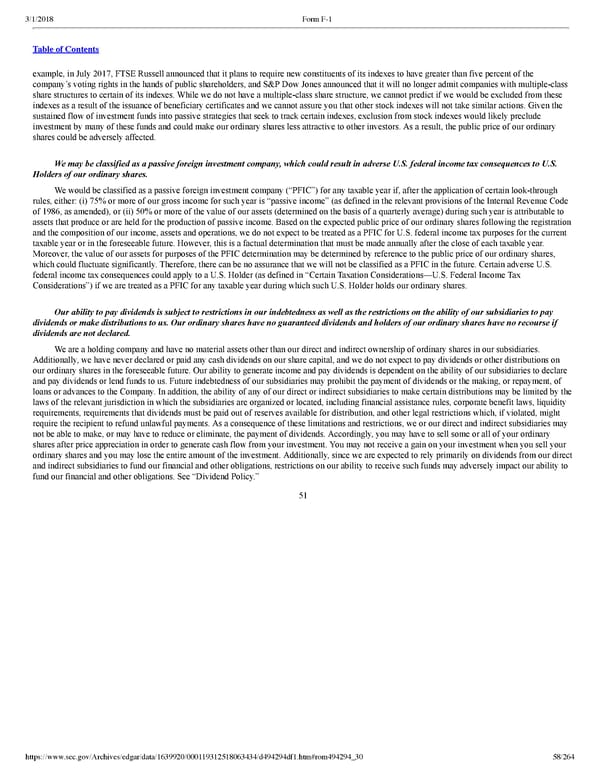58/264 example, in July 2017, FTSE Russell announced that it plans to require new constituents of its indexes to have greater than five percent of the company’s voting rights in the hands of public shareholders, and S&P Dow Jones announced that it will no longer admit companies with multipleclass share structures to certain of its indexes. While we do not have a multipleclass share structure, we cannot predict if we would be excluded from these indexes as a result of the issuance of beneficiary certificates and we cannot assure you that other stock indexes will not take similar actions. Given the sustained flow of investment funds into passive strategies that seek to track certain indexes, exclusion from stock indexes would likely preclude investment by many of these funds and could make our ordinary shares less attractive to other investors. As a result, the public price of our ordinary shares could be adversely affected. We may be classified as a passive foreign investment company, which could result in adverse U.S. federal income tax consequences to U.S. Holders of our ordinary shares. We would be classified as a passive foreign investment company (“PFIC”) for any taxable year if, after the application of certain lookthrough rules, either: (i) 75% or more of our gross income for such year is “passive income” (as defined in the relevant provisions of the Internal Revenue Code of 1986, as amended), or (ii) 50% or more of the value of our assets (determined on the basis of a quarterly average) during such year is attributable to assets that produce or are held for the production of passive income. Based on the expected public price of our ordinary shares following the registration and the composition of our income, assets and operations, we do not expect to be treated as a PFIC for U.S. federal income tax purposes for the current taxable year or in the foreseeable future. However, this is a factual determination that must be made annually after the close of each taxable year. Moreover, the value of our assets for purposes of the PFIC determination may be determined by reference to the public price of our ordinary shares, which could fluctuate significantly. Therefore, there can be no assurance that we will not be classified as a PFIC in the future. Certain adverse U.S. federal income tax consequences could apply to a U.S. Holder (as defined in “Certain Taxation Considerations—U.S. Federal Income Tax Considerations”) if we are treated as a PFIC for any taxable year during which such U.S. Holder holds our ordinary shares. Our ability to pay dividends is subject to restrictions in our indebtedness as well as the restrictions on the ability of our subsidiaries to pay dividends or make distributions to us. Our ordinary shares have no guaranteed dividends and holders of our ordinary shares have no recourse if dividends are not declared. We are a holding company and have no material assets other than our direct and indirect ownership of ordinary shares in our subsidiaries. Additionally, we have never declared or paid any cash dividends on our share capital, and we do not expect to pay dividends or other distributions on our ordinary shares in the foreseeable future. Our ability to generate income and pay dividends is dependent on the ability of our subsidiaries to declare and pay dividends or lend funds to us. Future indebtedness of our subsidiaries may prohibit the payment of dividends or the making, or repayment, of loans or advances to the Company. In addition, the ability of any of our direct or indirect subsidiaries to make certain distributions may be limited by the laws of the relevant jurisdiction in which the subsidiaries are organized or located, including financial assistance rules, corporate benefit laws, liquidity requirements, requirements that dividends must be paid out of reserves available for distribution, and other legal restrictions which, if violated, might require the recipient to refund unlawful payments. As a consequence of these limitations and restrictions, we or our direct and indirect subsidiaries may not be able to make, or may have to reduce or eliminate, the payment of dividends. Accordingly, you may have to sell some or all of your ordinary shares after price appreciation in order to generate cash flow from your investment. You may not receive a gain on your investment when you sell your ordinary shares and you may lose the entire amount of the investment. Additionally, since we are expected to rely primarily on dividends from our direct and indirect subsidiaries to fund our financial and other obligations, restrictions on our ability to receive such funds may adversely impact our ability to fund our financial and other obligations. See “Dividend Policy.” 51
 Spotify F1 | Interactive Prospectus Page 57 Page 59
Spotify F1 | Interactive Prospectus Page 57 Page 59